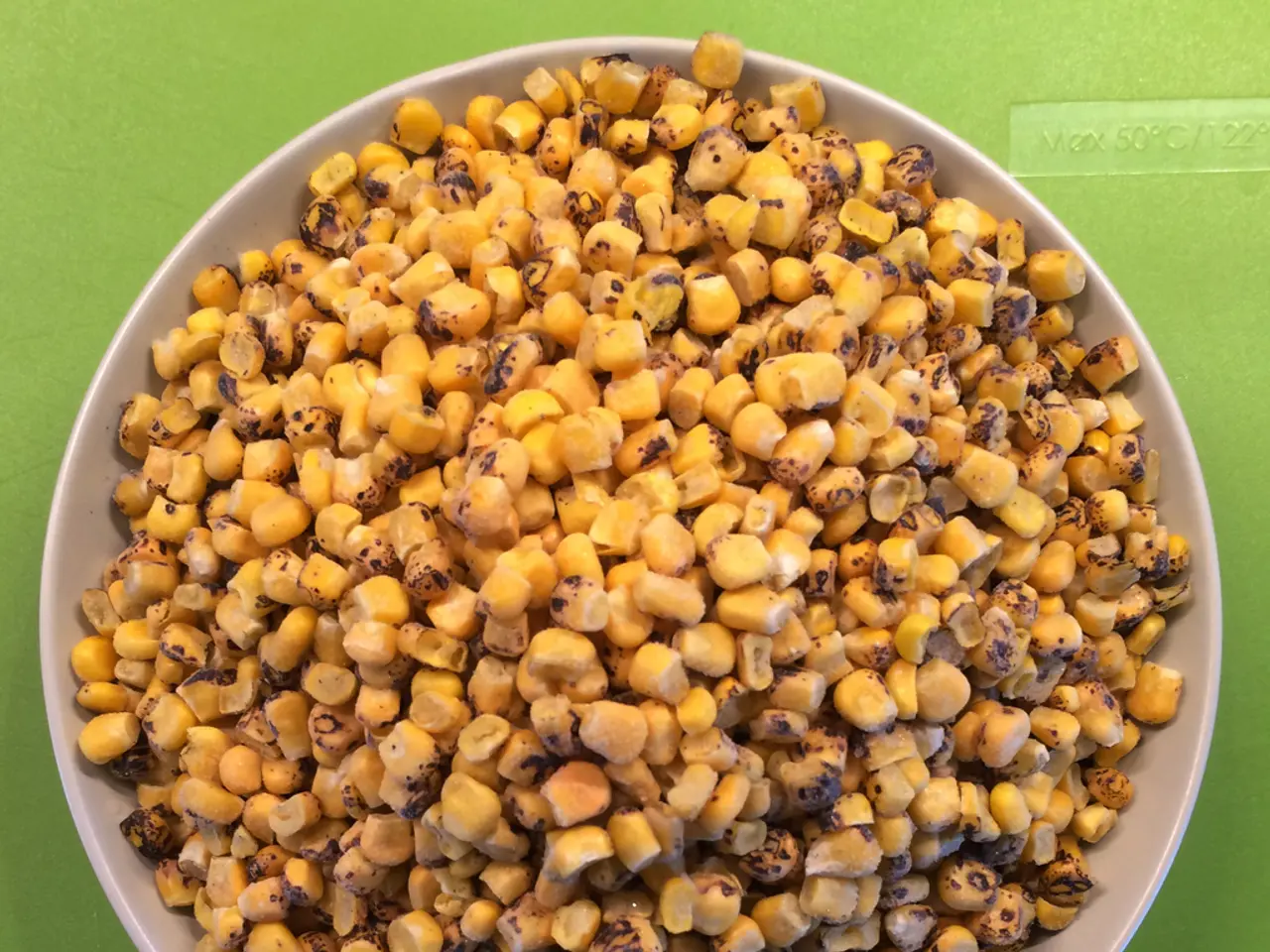Moderna's mRNA Vaccine Creators Plan to Disperse RNA Over Your Food Supply
Terrana Biosciences, a leading biotech company, has developed a groundbreaking synthetic RNA technology platform that could revolutionize the agricultural industry. This innovative approach delivers engineered RNA molecules to plants via a spray-on application, acting as programmable "plant vaccines" to protect crops against pests, diseases, and environmental stress[1][2][3].
The technology leverages RNA from plant viruses as a chassis, carrying "cargo RNA" into plants to help them fight infections and insects without altering their DNA. The spray-on RNA is distinct from GMO crop modifications or RNAi approaches, and is chemically modified to protect it from degradation in the environment, potentially reducing spray frequency compared to traditional pesticides[3].
Terrana claims this platform offers a precise, adaptive, and sustainable solution to increase crop resiliency, productivity, and sustainability for the global food supply, especially amid climate change challenges[1][2][4]. The CEO, Ryan Rapp, likens the platform to computer software, where instructions (RNA) can be updated and programmed to meet evolving agricultural needs[1][2].
However, concerns have been raised about the potential long-term effects on human health and the environment. Some scientists and physicians warn of unknown risks, given the novelty of the approach and the lack of long-term safety data[1][2]. Critics note the potential risks of introducing synthetic RNA into the food chain without thorough evaluation[1][2].
Regulatory bodies like the EPA have authorized similar RNAi-based products, but Terrana’s technology remains under scrutiny for potential unintended consequences. If synthetic RNA enters the food supply, its potential effects on humans when ingested daily are unclear. History shows corporations have assured the public of product safety, only for safety issues to emerge later[5].
Moreover, there are concerns about control and potential misuse. The rise of RNA agriculture could lead to a handful of biotech elites potentially dictating what grows, what thrives, and what ends up on your plate. Governments could potentially mandate RNA-based "treatments" during emergencies, and enforce RNA-laced food under the banner of "public health".
In summary, Terrana’s synthetic RNA technology is an innovative, non-GMO approach to crop protection that could transform agricultural practices and food supply resilience. However, its full impact on human health and the environment remains under investigation and debate[1][2][3][4]. As this technology continues to evolve, it is crucial for thorough evaluation, open dialogue, and responsible regulation to ensure its benefits are maximized while minimizing potential risks.
References: [1] Terrana Biosciences. (2021). Press Release: Terrana Biosciences Announces Breakthrough in Synthetic RNA Technology for Crop Protection. Retrieved from https://www.terranabio.com/press-releases [2] Science Daily. (2021). Synthetic RNA could revolutionize agriculture, says Terrana Biosciences. Retrieved from https://www.sciencedaily.com/releases/2021/05/210511134626.htm [3] Nature. (2021). Terrana Biosciences unveils synthetic RNA technology for crop protection. Retrieved from https://www.nature.com/articles/d41586-021-01509-7 [4] Forbes. (2021). Terrana Biosciences: The Future of Agriculture Lies in Synthetic RNA. Retrieved from https://www.forbes.com/sites/forbesbusinesscouncil/2021/05/13/terrana-biosciences-the-future-of-agriculture-lies-in-synthetic-rna/?sh=7a58554d5c84 [5] The Guardian. (2021). The dark side of the green revolution: how chemical companies took over agriculture. Retrieved from https://www.theguardian.com/environment/2012/mar/13/dark-side-green-revolution-chemical-companies
- The revolutionary synthetic RNA technology developed by Terrana Biosciences, in conjunction with the scientific community, offers a potential solution to address medical-conditions related to health and wellness, such as food-and-drink safety, by improving crop resiliency and productivity.
- This approach, considered a significant leap in technology, could potentially redefine health-and-wellness lifestyle choices, as the technology may help combat pests, diseases, and environmental stress in a sustainable manner, promoting a healthier environment.
- However, concerns persist regarding the long-term impact on general-news issues like human health, politics, and the environment, given the novelty of this technology and the need for thorough safety evaluation.
- In light of these considerations, discussions about the benefits and risks associated with the technology should be ongoing, fostering an environment conducive to open dialogue and responsible regulation.
- Stakeholders should also address concerns regarding control and potential misuse, ensuring that this technology, which holds the promise of achieving food-and-drink safety and a sustainable future, does not inadvertently lead to the concentration of power in the hands of a few biotech elites.
- Correspondingly, the integration of synthetic RNA in food and agricultural processes should be approached with caution, with thorough safety and efficacy studies, and regulations considered to protect both human health and the environment.




